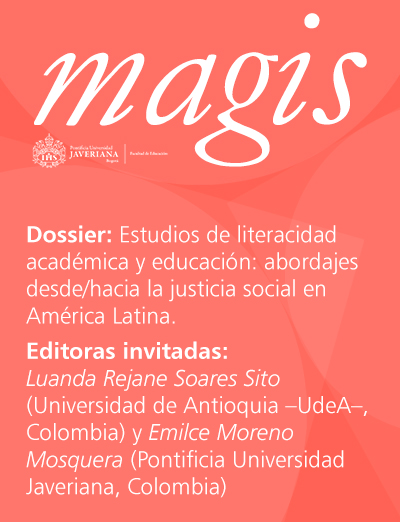Abstract
Academic literacy develops within social systems and contexts of which it is part. Consequently, it is intertwined with the circulation of power and the potential for social transformation. This study aims to understand the practices of academic literacy both within and outside the university setting among first-generation students accessing higher education in Mexico, Colombia, and Costa Rica. Through an ethnographic approach, the author documented the literacy practices of nine first-generation students in public universities. This article presents representative cases of academic literacy practices that limit access to social justice, as well as out-of-class practices through which students resist and demonstrate their transformative capacity. The findings indicate that certain pedagogical practices at the university level serve as barriers to achieving social justice through academic literacy. This study is significant as it highlights the importance of understanding and integrating the practices, interests, and experiences of students in literacy education, thereby prompting a re-evaluation of pedagogical practices to foster more equitable educational processes.
Albright, J. & Luke, A. (2008). Pierre Bourdieu and literacy education. Taylor & Francis. https://doi.org/10.4324/9780203937501
Baker, E. (2022). Crafting qualitative research questions. A prequel to design. Sage. https://doi.org/10.4135/9781071938935
Bazerman, C. (2005). Reference guide to writing across the curriculum. Parlor Press.
Bernard, H. (2011). Research methods in anthropology. Rowman Altamira.
Borg, S. (2001). The research journal: A tool for promoting and understanding researcher development. Language Teaching Research, 5(2), 156-177. https://doi.org/10.1177/136216880100500204
Brandt, D. & Clinton, K. (2002). Limits of the local: Expanding perspectives on literacy as a social practice. Journal of Literacy Research, 34(3), 337-356. https://doi.org/10.1207/s15548430jlr3403_4
Calle-Arango, L. & Ávila-Reyes, N. (2020). Alfabetización académica chilena: revisión de investigaciones de una década. Literatura y Lingüística, (41), 455-482. http://dx.doi.org/10.29344/0717621x.41.2280
Charmaz, K. (2014). Constructing Grounded Theory. Sage.
Carlino, P. (2013). Alfabetización académica diez años después. Revista Mexicana de Investigación Educativa, 18(57), 355-381.
Collins, J. & Blot, R. (2003). Literacy and literacies: texts, power, and identity. Cambridge University Press.
Cope, W. & Kalantzis, M. (1993). The Powers of Literacy: a genre approach to teaching literacy. Falmer Press. https://doi.org/10.4324/9780203149812
Lewis, C., Enciso, P., & Moje, E. (2007). Identity, agency and power: reframing sociocultural research on literacy. Lawrence Erlbaum Associates. https://doi.org/10.4324/9781003064428
Monte-Mór, W. (2008). Critical literacies, meaning making and new epistemological perspectives. Matices en Lenguas Extranjeras, 2.
Murillo, M. (2012). El estado de la investigación en la enseñanza de la lectura y la escritura en la universidad colombiana. EIDOS, 5, 47-96. https://doi.org/10.29019/eidos.v0i5.95
Navarro, F. (2023). La enseñanza de la escritura académica en tramas de desigualdad social. En N. Goren y J. Maldovan Bonelli, Desigualdades en el siglo XXI. Aportes para la reflexión en clave latinoamericana (pp. 333-359). EDUNPAZ.
Nicholes, J., & Reimer, C. (2020). The impact of taking basic writing on later writing course performance and graduation at a career-focused four-year university. Journal of Basic Writing, 39(1), 36-63. https://doi.org/10.37514/JBW-J.2020.39.1.03
Paris, D. (2012). Culturally sustaining pedagogy: A needed change in stance, terminology, and practice. Educational Researcher, 41(3), 93-97. https://doi.org/10.3102/0013189X12441244
Perry, K. (2012). What is Literacy? A Critical Overview of Sociocultural Perspectives. Journal of Language and Literacy Education, 8(1), 50-71.
Rogers, A., & Street, B. (2011). Using ethnographic approaches for understanding and teaching literacy: perspectives from both developing and western contexts. Viden om Læsning (Knowledge About Reading) special issue, Jorden læser (Literacy Around the World), (10), 38-47.
Sito, L., & Moreno, E. (2021). Prácticas letradas académicas más allá del déficit: una revisión crítica de literatura. Enunciación, 26, 149–169. https://doi.org/10.14483/22486798.16747
Soliday, M. (2011). Everyday genres: Writing assignments across the disciplines. SIU Press.
Street, B. (1984). Literacy in theory and practice (Vol. 9). Cambridge University Press.
Street, B. (1997). The implications of the ‘New Literacy Studies’ for literacy education. English in Education, 31(3), 45-59. https://doi.org/10.1111/j.1754-8845.1997.tb00133.x
Street, B. (2005). Literacies across educational contexts: Mediating learning and teaching. Caslon Pub.
The New London Group. (1996). A pedagogy of multiliteracies: Designing social futures. Harvard Educational Review, 66, 60-92. https://doi.org/10.17763/haer.66.1.17370n67v22j160u
Trigos-Carrillo, L., & Rogers, R. (2017). Latin American influences on multiliteracies: From epistemological diversity to cognitive justice. Literacy Research: Theory, Method, and Practice, 66(1), 373-388. https://doi.org/10.1177/2381336917718500
Trigos-Carrillo, L. (2019a). A critical sociocultural perspective on academic literacies in Latin America. Íkala, Revista de Lenguaje y Cultura, 24(1), 13-26. https://doi.org/10.17533/udea.ikala.v24n01a10
Trigos-Carrillo, L. (2019b). Community cultural wealth and literacy capital in Latin American communities. English Teaching: Practice & Critique, 19(1), 3-19. https://doi.org/10.1108/ETPC-05-2019-0071. https://doi.org/10.17227/folios.51-8429
Vargas-Franco, A. (2020). De la alfabetización académica a las literacidades académicas: ¿teorías y métodos en disputa? Folios, 51, 63-77.
Yin, R. (2014). Case study research: Design and methods. Sage Publications. https://doi.org/10.3138/cjpe.30.1.108

This work is licensed under a Creative Commons Attribution 4.0 International License.
Copyright (c) 2024 Lina Trigos-Carrillo



